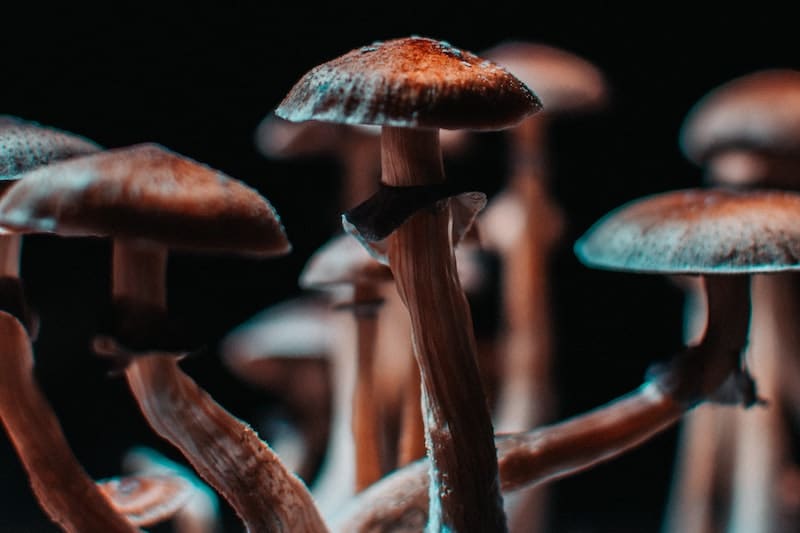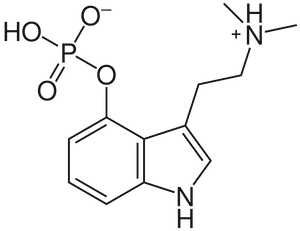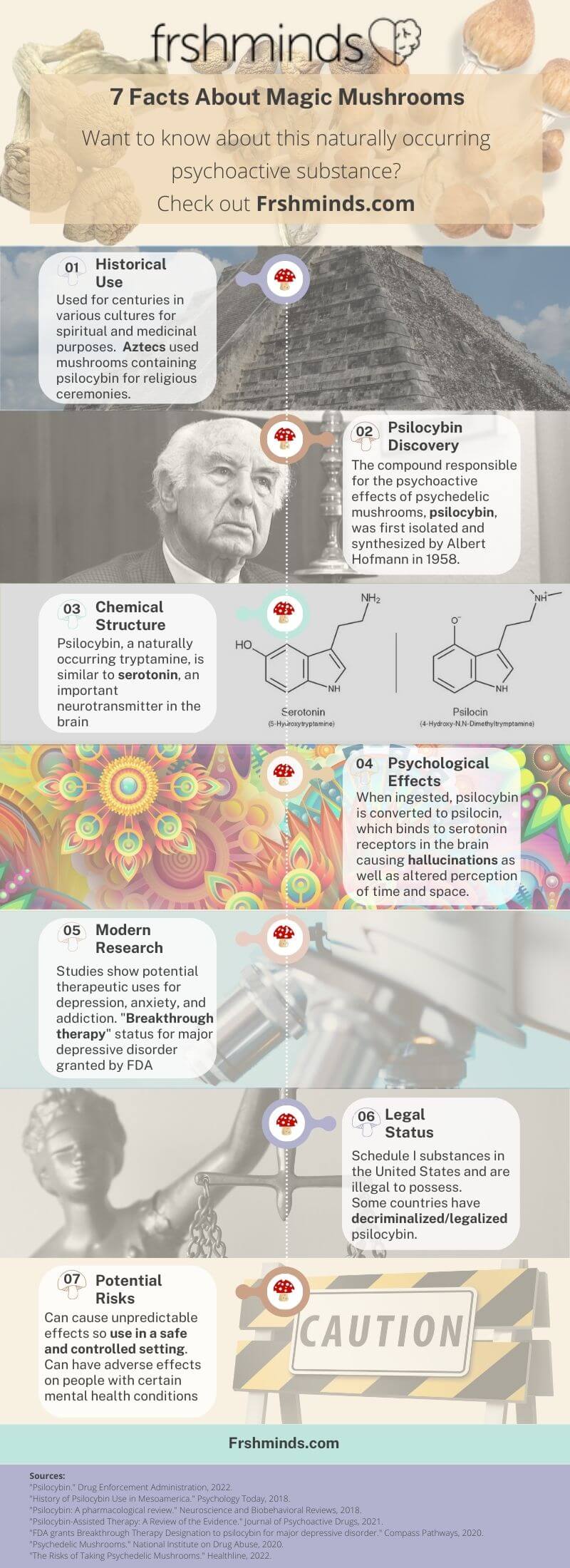
What Kind of a Drug is Psilocybin? What Will It Do To Me?
As psychedelic therapy gains an ever increasing amount of traction in the medical community, two questions often come to mind, “What kind of a drug is Psilocybin? and “What will it do to me?”. Hopefully after reading this quick article, you’ll be able to answer these two questions.
What Kind of a Drug is Psilocybin?

Psilocybin, a compound that occurs naturally in numerous species of psilocybin mushrooms, is metabolized into psilocin (4-OH-dimethyltryptamine) is a classic “psychedelic” drug and a non-selective serotonin 2A receptor (5-HT2AR). Psilocin can have effects on the mind that are comparable to LSD, DMT and mescaline. Both psilocybin and psilocin normally occurs in mushrooms of the “psilocybe” genus and has a structural similarity to serotonin (5-OH-tryptamine, 5-HT), an endogenous neurotransmitter.
Bascially the effects of both compounds include:
- Euphoria
- Alterations in perception
- Mental and visual delusions
- A distorted concept of time
- Spiritual experiences
- Can lead to possible unfavourable reactions like anxiety attacks and nausea.
The effects of psilocybin, which alter one’s state of mind, typically persist for a period ranging from two to six hours, but the duration may seem longer to those who are under its influence because it can disrupt their sense of time. The drug does not have a high level of toxicity and poses little risk of harm. However, the possession of mushrooms containing psilocybin is prohibited in numerous countries since it has been identified as a scheduled drug according to various national laws.
The History of Psilocybin
European History: Ancient rock paintings and murals in Algeria and modern-day Spain contain visuals that indicates human use of psilocybin mushrooms may have existed prior to the recorded history.
North American History: Before Spanish chroniclers recorded their use in the 16th century, psilocybin mushrooms had already been ingested as part of foretelling and spiritual ceremonies for a significant period of time
The Rediscovery of Psilocybin
A number of the figures that played a role in the exploration of LSD figure prominently in the rediscovery of Psilocybin. Albert Hofmann, who is a Swiss chemist, is famous for the synthesis of LSD and isolation of psilocybin from a Psilocybe mexicana mushroom in 1959. Sandoz, the company where Hofmann worked, targeted and sold psilocybin to clinicians and physicians around the globe for the purpose of psychedelic psychotherapy. Research on the effects of psilocybin and hallucinogens was hindered by rising restrictive laws on drugs during the late 1960s. However, their popularity surged in the subsequent decade, tremendously due to the greater availability and access of informative content on the method of cultivating psilocybin mushrooms.
Timothy Leary’s Psilocybin Research
In the early 1960s, Timothy Leary conducted the research into how the effects of psilocybin are influenced by the user’s set and setting of experience. The drug was administered to subjects in a comfortable setting, designed to resemble a living room, and they were asked to complete questionnaires evaluating their experiences and the role of situational and background factors. His research found that:
- Participants with previous experience using psilocybin reported more positive experiences compared to those who had not used the drug before.
- The response to psilocybin was influenced by various factors including dosage, group size, expectancy and preparation. Participants in groups with more than eight people reported feeling less supported and having less pleasant experiences, while those in smaller groups of less than six individuals were perceived to be more supportive and resulted in more positive trip outcomes.
Leary and other researchers suggest that psilocybin increases suggestibility, thereby individuals would be more responsive to relational interactions and environmental stimuli.
Related Infographic: 7 Facts about Magic Mushrooms

What Kind of a Drug is Psilocybin: The Possible Effects
The effects of psilocybin can vary in intensity and duration depending on several factors, such as:
- Types of mushrooms
- Dosage
- Individual physiology such as their weight, metabolism, and sensitivity to the drug
- Set and setting
The physical effects of psilocybin include:
- Pupil dilation;
- Changes in heart rate;
- Changes in blood pressure. The temporary increases in blood pressure caused by the drug can be a risk factor for users with pre-existing hypertension;
- Changes in stretch reflex, and
- Inability to properly direct or limit motions
Psilocybin can elicit various subjective effects that fall under a broad spectrum of psychological experiences such as:
- Disorientation;
- Lethargy;
- Giddiness;
- Euphoria;
- Joy, and;
- Depression.
Research in to the Psychological Effects of Psilocybin
The Effects of High Doses of Psilocybin
In a 2011 study, according to Roland R. Griffiths, the administration of a single large dose of psilocybin can result in persistent alterations to the user’s personality. There are approximately half of the participants in the study were reportedly in good health, regularly engaged in spiritual activities, and holding graduate degrees, reported feeling increased amounts of openness after attending the psilocybin session for more than one year. This finding is tremendously crucial since “no study has prospectively demonstrated personality change in healthy adults after an experimentally manipulated discrete event”. In 2017, a study discovered that administering doses of psilocybin at levels between 20 to 30 mg per 70 kg of body weight, which caused mystical-like encounters, had a more enduring positive impact on characteristics such as gratitude, altruism, indulgence, and feeling emotionally connected to others.
During another study, 31% of participants who were given a high dosage, were reported to experience significant fear and 17% of participants experienced temporary state of excessive or irrational suspicion. When taken in higher doses, psilocybin can result in a heightened emotional response, an increased capacity for self-reflection, a regression to more primitive and childlike thought patterns, and the stimulation of vivid memory recall accompanied by pronounced emotional states. It is also typical to experience open-eye visual illusions.
The Effects of Moderate Doses of Psilocybin
According to research conducted at Johns Hopkins, when participants were given a moderate dose of a substance (which still had a high potential of inducing a beneficial and positive experience), negative experiences were uncommon. However, one-third of those who were administered a high dose reported experiencing anxiety or sense of fear and suspicion.
The Effects of Low Doses of Psilocybin
Hallucinatory effects could be induced by low doses of drugs. It is also possible to experience closed-eye hallucinations, which means individual may see colorful geometric shapes and lively imaginative sequences. Some individuals may have the chance to experience synesthesia, such as having tangible sensations when looking at colors.
Related Articles
Learn more about Psilocybin on Frshminds:
- Considering a retreat? Check out Frshminds’ Ultimate Psilocybin Retreat Center Guide.
- What Kind of a Drug is Psilocybin? What Will It Do To Me?
- How Long Does Psilocybin Stay in Your System?
- Don’t Miss the Best Psilocybin Retreats in Amsterdam
- How To Properly Store Magic Mushrooms
- Why Are There Psilocybin Retreats In Mexico?
- Want To Go To A Magic Mushroom Retreat in Jamaica?
- 3 Top-Rated Psilocybin Retreats in Costa Rica
- The Best Psilocybin Retreats: What To Look For
- Psilocybin Retreats in the Netherlands

Comments